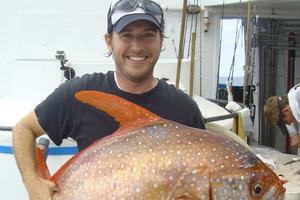Salmon gods, or kingfish moon, is able to maintain its internal temperature to 5 ° C warmer than its surroundings, giving it a huge evolutionary advantage in the depths.
The salmon of the gods, or Opah ( Lampris guttatus ), is the first fish ever identified warm blood. This unexpected finding is a credit to researchers at NOAA (National Oceanic and Atmospheric Administration) who sign a long publication in the journal Science .
Fish joins the birds and mammals in the restricted circle of vertebrates capable of maintaining a body temperature above that of its environment for long periods.
The animal, which can reach two meters long and weigh nearly 300 kg, has a particular physical: relatively flat face and round as the moon profile, which earned him one of his nicknames: the kingfish moon. He lives deep in the ocean, several hundred meters below the water level. The temperature there never exceeds the small ten degrees.
In a world in slow motion, so this formidable predator acts Formula 1 since maintained his body temperature 5 ° C above that of surrounding water allows it to move much faster than their prey, mainly crustaceans and cephalopods, which remain paralyzed by the cold. Perhaps this is one of the reasons we find salmon gods almost anywhere in the world.

The lead author of the article, Nick Wegner, with Opah it has just captured <. /> span>
This is beating its fins the fish manages to warm his body. We already knew that tuna and sharks could occasionally warm their head or some muscles in this way, especially for hunting, but it had nothing comparable nor as effective as the strategy put in place by the kingfish moon.
The latter has genuine heat exchangers against the tide at its gills. The composure that comes from loading oxygen circulates in a ship trapped in the one that arrives warm, since the fin muscles. The oxygenated blood warms up before diving inside the body where it can keep warm internal organs.
No comments:
Post a Comment